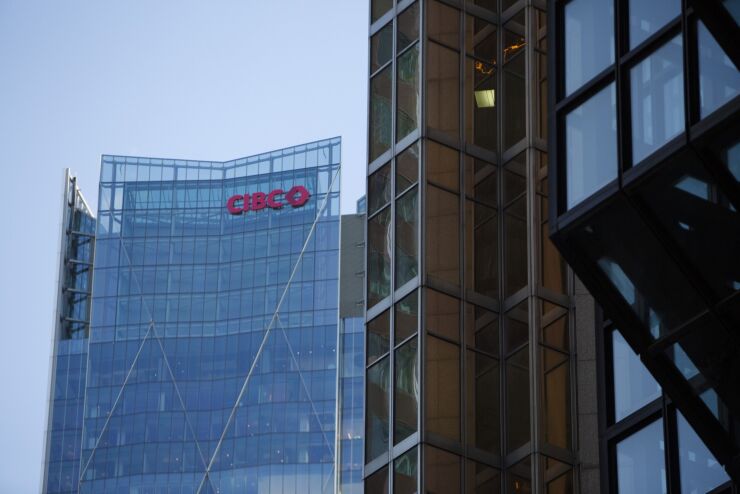
The Canadian bank CIBC is deemphasizing U.S. office lending amid sluggish return-to-office trends and rising loss provisions.
Because of the pullback in office loans, executives at the Toronto-based company said they expect slower U.S. growth than the bank has enjoyed in recent years. CIBC is projecting mid-single-digit loan growth in its U.S. business, driven primarily by commercial and industrial loans and the wealth management segment.
CIBC reported Thursday that its allowance coverage ratio for U.S. office loans nearly doubled from 4.1% in the previous quarter to 7.6% during the three-month period that ended July 31. CIBC has relatively large concentrations of office loans in the Chicago, Boston, Washington, D.C., and Miami metropolitan areas.
By the end of the year, the bank will have reviewed its entire U.S. office loan portfolio, Chief Risk Officer Frank Guse said Thursday. "We are doing so on a very, very granular and very intense basis, and we have a dedicated team doing that," he said during the company's quarterly earnings call.
"Overall, our credit portfolio is performing very well in the U.S., so it is isolated to the office sector," Guse said.
CIBC,
By the fourth quarter of last year, CIBC's U.S. operations accounted for 20% of the company's net income. That number was 15% in the most recent quarter, as the rising loss provision eroded U.S. profits.
Office loans
At CIBC, which is one of Canada's big six banks, executives noted Thursday that U.S. office loans represent less than 1% of the company's total loan portfolio. Similarly, the net charge-off ratio on U.S. office loans is currently less than 1%.
"We expect to see losses in and around the current level for the portfolio for the next few quarters," Guse said.
Still, as a result of the pullback in office loans, the commercial real estate segment will become a smaller percentage of CIBC's total U.S. business, according to Shawn Beber, CIBC's group head for the U.S. region.
Mario Mendonca, an analyst at TD Securities, asked CIBC executives if deemphasizing U.S. office loans would lead to slower growth in the U.S., and Beber responded that it will.
"Part of that is environment," Beber explained, "and part of that is going to be strategic choices."
During the most recent quarter, CIBC's U.S. commercial banking and wealth management segment reported net income of $55 million USD, which was down 64% from the same period a year earlier. The bank attributed the decline primarily to the higher provision for credit losses, lower fee income and higher employee-related costs, though those factors were partially offset by a bigger net interest margin and loan volume growth.
CIBC's capital markets unit, which includes some U.S. operations, reported an 11% increase in net income, as higher revenue more than outweighed an increase in noninterest expenses.






